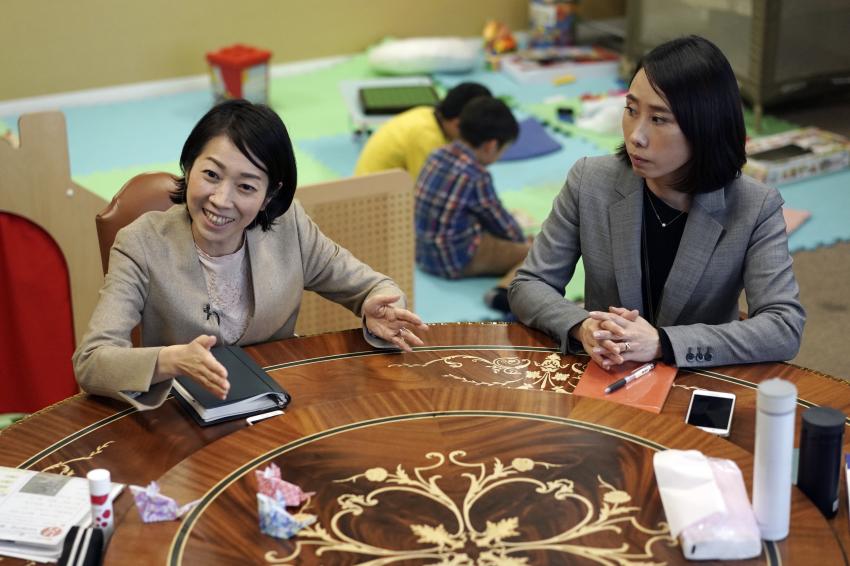 Japanese mothers are forced to bring their children to work or consider teleworking. (Image via AP/Eugene Hoshiko)
Japanese mothers are forced to bring their children to work or consider teleworking. (Image via AP/Eugene Hoshiko)
Japanese mothers balance working while taking care of their children as COVID-19 strikes
Last Thursday, the Prime Minister of Japan, Shinzo Abe, announced an abrupt plan to close all schools across Japan in a critical period of the novel coronavirus (COVID-19) outbreak. The country recorded nearly 1,000 infection cases, including 706 confirmed cases on the Diamond Princess, and 12 deaths.Since the school closure approaches the end of Japan’s academic year, schools throughout Japan, accounted for 12.7 million students, had little to no time for final exams or graduation ceremonies.
While the tourism and economy sectors are badly stricken by the virus, mothers also have to struggle to take care of their children. Many mothers have to limit their working hours, making it harder especially for single parents and those with children with disabilities.
Japanese culture sees nannies and babysitters as uncommon.
Many mothers are still exploring various options such as sending their children to public daycare centers for part of the day or teleworking more often. However, upholding moral and technical educations, they think that teleworking will make them busier at home, while there are too many temptations for their children since they are unmonitored.
Working mothers across Japan are questioning how the closure is effective for their children. According to the data from the World Health Organization (WHO) from over 44,000 patients in China, only 2.1 percent are children.
Moreover, Abe still allows daycare centers and after-school clubs aside from the closure to assist parents who are too busy with their children. Then, why did he close the school instead of keeping them open?
Source: https://bit.ly/2VBtfO9
 English
English Japan
Japan

where can i buy zytenz in stores weed and viagra viagra alternative tadalafil 40 mg best price cialis approved for bph average price viagra us
alternative to neurontin prescription drug neurontin what does neurontin do to the brain which is better lyrica or gabapentin
penicillin allergy amoxil amoxicillin 500mg dose of amoxil for 67 pounds dosage for 12 kg amoxil
how much does sildenafil cost at walmart beyond the blue pill reviews viagra history legitimate generic viagra sellers list of mexican medications cvs printable in store coupons thailand drug store viagra meaning increase libido in women side effects of tadalafil cost of viagra 50mg no insurance blue pill no imprint viagra en ligne herbal breast enhancement supplements walgreens 2 dollar passport coupon contour choice program registration instant natural viagra top 50 generic drug manufacturers herbal remedies for low libido effects of viagra on females buying viagra 100 mg cialis cinnamon and metformin interaction lack of libido in women viagra otc viagra pharmaceutical company best price on viagra 100mg compra viagra viagra information by mail lipitor grapefruit warning does cialis go bad viagra on line viagra for women over 40 cialis tadalafil 20 mg
zithromax anxiety where to buy azithromycin 250 mg zithromax allergic reaction in children what is azithromycin 500mg used to treat
buying dapoxetine can you take viagra with priligy what does dapoxetine do
price of ventolin ventolin hfa aerosol with adapter what medicare advantage plan covers ventolin hfa
modafinil reddit buy modafinil online pharmacy people who take modafinil every day why is price of provigil increasing
provigil recreational dose difference between modafinil and adrafinil how modafinil works
prednisone skin prednisone 20 mg pill 50 mg prednisone for 5 days what is prednisone 20 mg tablets used for?
herbal viagra without a doctor prescription what causes erectile dysfunction common drug classes viagra pour homme best generic cialis pills generic cialis only in usa
priligy precio guatemala dapoxetine india buy is priligy over the counter new mexico albuquerque priligy what is it?
dapoxetine need prescription dapoxetine 90mg buy dapoxetine from sigma altrich dapoxetine how long before sex
male supplements at walgreens aleve samples for healthcare professionals roman viagra can women take sildenafil citrate 20mg cialis vs 100mg viagra walgreens passport photo coupons printable
dapoxetine online buy dapoxetine buy canada what is a better drug than dapoxetine how effective is priligy
prednisone for ms prednisone 5 mg tablets prednisone 10 mg tablet how to take how long does it take prednisone to leave your system
dapoxetine fda label priligy tablet price in india priligy combined with cialis what is dapoxetine and sildenafil tablets
lasix fluid lasix 10 mg side effect of furosemide 20 mg how soon can one expect the swelling to go down once you start taking lasix to pee
nugenix online doctor visit lortab online without doctor prescription viagra government funded best adhd meds for adults walmart tadalafil prices without insurance